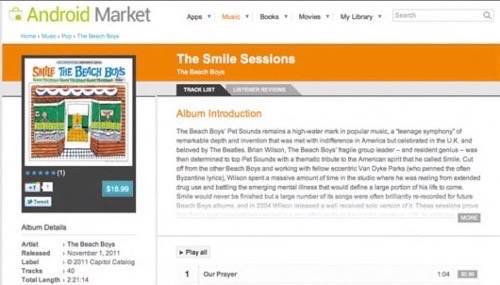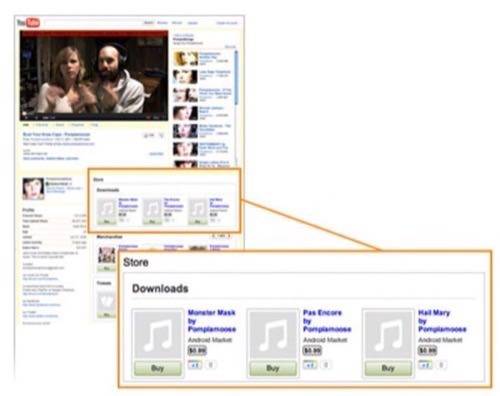The world’s biggest search engine company turned its music initiative up a notch today. Google Music now includes an MP3 store, in addition to the cloud-based music storage that launched into beta in May. At the company’s event in Los Angeles today, they removed the “beta” label from Google Music and made it available to all U.S. users. For the cloud storage part they launched originally, they’re keeping the “free” price tag firmly applied.

Rather than charging for storage, as Apple and Amazon do, Google is allowing users to store up to 20,000 tracks for free. So how will they make money? They’ve partnered with three of the four major music labels (Warner Music didn’t sign on) and several independent ones to sell high-quality, 328 kbps MP3 files to users. Google will take a 30% revenue share on each track sold.
Google has an uphill battle in front of it when it comes to competing with Apple in this space, which is currently dominated by iTunes. To do that, Google is throwing in some extra features and exclusive content, which it hopes will draw people to Google Music and at the same time, help bolster both Android and Google+.
The new music store, which is now live in the Android Market, already has 8 million songs in it, and that number will rise to 13 million in the coming weeks. Still, that puts it about 7 million songs behind iTunes, which has deals in with all four major labels, most indie labels, and even convinced The Beatles to get on board two years ago. That said, the iTunes Store has been live since 2003 and it’s had all that time to build up its catalog. For only being live less than hour, Google Music is catching up to the likes of Apple and Amazon pretty fast.

Google Throws in a Few Perks
To help draw listeners in, Google is offering high-quality audio, free storage, some unique social features and artist exclusivity.
As expected, Google Music is integrated with Google+, the young social network that is increasingly at the heart of Google’s product strategy. When users share music on Google+, those tracks are available to their friends for free for up to one listen. This is also true of entire albums shared on Google+.
To make the product more appealing at launch, Google named several artists that are releasing new material exclusively Google Music. The new studio album by rapper Busta Rhymes is being released exclusively on Google Music, and several other artists, such as Pearl Jam and the Rolling Stones, are releasing exclusive live alums through the new service. Notably, another artist on the list is Coldplay, who recently pulled their catalog from Spotify over concerns about low royalty payments.
Devoted users of Apple products may still be lured by iTunes Match, which doesn’t require a lengthy bulk file upload. Still, for the price (free), Google Music can probably convince a lot of people to sit and wait for their files to transfer.
A Leg Up For Independent Artists
Although Google has partnered with most of the major labels, it’s hard to miss that part of what they’re launching could serve to further undermine the importance of record labels and other twentieth century relics of the music industry.
Through its Artist Hub, Google Music is giving artists tools to market themselves and sell their music directly to fans. For a one-time fee of $25, any artist can set up a profile, upload an unlimited amount of their music, manage photos and even set their own prices.

If Google Music takes off, this may well prove to be a viable source of revenue for emerging artists, many of whom are wary of the low royalty payments offered by streaming services like Rdio and Spotify. Artists can also sell tracks directly through YouTube, which is already a prominent source for music discovery.
Just as with signed artists, independent artists who upload their music to Google’s storefront will get a 70% cut of all revenue generated by MP3 sales.

















